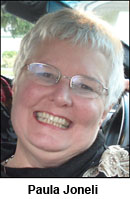OPINION
This is what small, deregulated government looks like: Somalia
On the Republican side of the Presidential Sweepstakes, we hear the constant call for “small government” and “getting rid of regulations.”
Kansas Tea Party Gov. Sam Brownback claims he is shrinking government by eliminating agencies, cutting jobs, and slashing spending. Yet, nothing is said about a news item last October when the City Council of Topeka voted 7-3 to decriminalize domestic abuse because there is no money in the city or county budgets to prosecute those cases. In September 2011, 18 Topeka domestic abusers were arrested and released because there was no staff or budget to prosecute these criminals.
This is what you get when you shrink government to the point that it can no longer protect its people — you get a government that can no longer protect its people.
Cities across the nation are turning off street lights to save money. In Highland Park, MI, they not only turned off the lights, they tore out the actual streetlight infrastructure. Now neighborhoods disappear as night falls. Drivers can not see pedestrians until they are immediately in front of them. Potholes appear when it is too late to avoid them. Children walking to school in pre-dawn darkness are invisible to drivers. Evening events are being cancelled or scheduled earlier in the interest of participant safety.
The 2010 BP oil explosion in the Gulf of Mexico was, in part, caused by under-funded regulators having to rely on inspection reports made up by companies, and no regulatory staff to audit those (often false) corporate reports.
The 2009 shooting of the four Lakewood police officers and Christmas Eve 2011 beating death of a Woodinville teacher were committed by parole-evaders. It is easy to avoid a parole officer when those departments are seriously understaffed due to budget cuts.
Here in Seattle, Mayor Mike McGinn wants to clean up Third Avenue; currently rife with open-air drug deals, the homeless, the mentally ill, and loitering street kids. Budget cuts to “shrink government” over the past 30-plus years have left us with shuttered mental hospitals and homeless shelters, reduced law enforcement, and less community support to keep kids in safe environments.
In New York City, police precincts are refusing to complete crime reports for “less serious” incidents; largely due to inadequate staffing. Of course, one of the end results of this is that statistics will show a drop in crime rates, resulting in even more staff reductions. Some might call that progress. I call it a “death spiral!”
And then there is the closely-related cry to “slash (job-killing) regulations.” Imagine construction sites with no hardhats, buildings with no fire escapes, factories with no safety shields, highways with no rules, food processing plants with no sanitation…
In the U.S., regulations and laws are generally written in response to egregious corporate behavior that placed their employees and/or the general population in grave danger. Some examples are:
In 1906 in Colorado, when miners struck for better working conditions, mine owners fired on the striking miners, then turned them and their families out of their company-owned homes into the Colorado winter with only company scrip in their wallets. Many froze to death. This crisis of cruelty caused President Theodore Roosevelt to recognize unions’ right to bargain for wages and working conditions.
In March 1911, the Triangle Shirtwaist Factory fire in New York City killed 148 workers, aged 14 to 48; mostly young immigrant women. There was no audible fire alarm in the building, and exit doors were locked “to prevent theft.” The exterior metal fire escape had previously rusted and not been repaired. Sixty-two people jumped or fell to their deaths from their 8th, 9th and 10th floor workplaces. When the fire department arrived, their ladders only reached to the sixth floor. In the wake of this tragedy, the NYC Fire Chief inspected every factory in the city, finding more than 200 unsafe, and the American Society of Safety Engineers was founded October 14, 1911. By 1915, New York state had modernized its labor laws, making it one of the most progressive labor states.
These are just two instances of employee abuse that led to passage of laws, rules and regulations to improve the lot of the working person. The Wage and Hour Act defined the 40-hour work week, overtime requirements, rest and meal breaks. The Occupational Safety and Health Act defined the requirements of a safe workplace. The National Labor Relations Act codified the right of workers to organize into labor unions. The Equal Employment Opportunity Act requires employers to treat all employees equally regardless of race, creed, color, gender, age, or national origin. The Retirement Income Security Act attempted to guarantee that pensions earned were protected.
Outside the employment realm, laws are enforced with regulations requiring specific treatment of all citizens and our natural resources. Civil Rights, Voting Rights, Equal Credit, Truth in Lending, Clean Air, Clean Water, Food Safety and countless other laws that make our country a little better place to live.
Imagine our lives and our country without these protections. We have already attempted a rollback of regulations in 1999 when banking regulations were repealed. Less than 10 years later, our economy collapsed under the weight of previously-prohibited banking practices.
If all these “small government” promoters want less “government interference” and regulation in their lives, I suggest they move to Somalia where there is NO government to interfere with them and no regulation of business. Oh wait! The primary business of Somalia is unregulated piracy. Let them Occupy Somalia — and leave the U.S.A. to the rest of us!
Paula Joneli is a Democratic Precinct Committee Officer in the 33rd Legislative District and provides monthly articles to the 33rd District Demochat. She is a retired banker who “suits up and shows up” at rallies and events in support of labor, equal justice and human rights.






